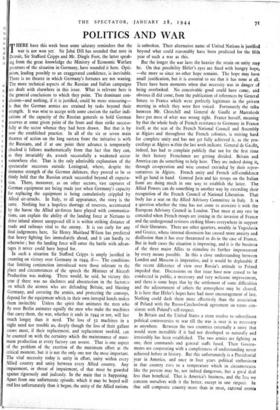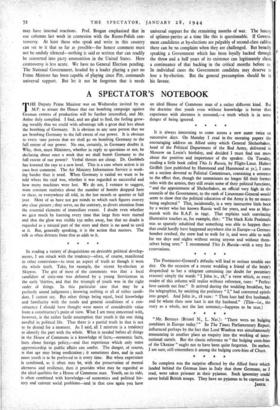POLITICS AND WAR
THERE have this week been some salutary reminders that the war is not won yet: Sir johii Dill has sounded that note in Detroit, Sir Stafford Cripps and Mr. Dingle Foot, the latter speak- ing from the great knowledge the Ministry of Economic Warfare possesses of the situation in Germany, have sounded it here. Opti- mism, leading possibly to an exaggerated confidence, is inevitable. There is no theatre in which Germany's fortunes are not waning. The more technical aspects of the Russian and Italian campaigns are dealt with elsewhere in this issue. What is relevant here is the general conclusions to which they point. The dominant con- clusion—and nothing, if it is justified, could be more reassuring— is that the German armies are strained by tasks beyond their strength. It was wise to accept with some caution the earlier indi- cations of the capacity of the Russian generals to hold German reserves at some given point of the front and then strike success- fully at the sector whence they had been drawn. But that is by now the established practice. In all of the six or seven main theatres of action on the long eastern front the initiative is with the Russians, and if at one point their advance is temporarily checked it follows mathematically from that fact that they can, as they invariably do, assault successfully a weakened sector somewhere else. That is the only admissible explanation of the spectacular successes outside Leningrad, where, despite the immense strength of the German defences, they proved to be so thinly held that the Russian attack succeeded beyond all expecta- tion. There, moreover, as on other sectors, vast captures of German equipment are being made just when Germany's capacity for replacing the equipment is being cumulatively crippled by Allied air-attacks. In Italy, to all appearance, the story is the same. Nothing but a hopeless shortage of reserves, accentuated by the havoc the Allied air-forces have played with communica- tions, can explain the ability of the landing force at Nettuno to drive inland almost unopposed till it is within striking distance of roads and railways vital to the enemy. It is too early for any final judgements here, Sir Henry Maitland Wilson has predicted that heavy fighting lies immediately ahead, and it can hardly ce otherwise ; but the landing force will enter the battle with advan- tages it never could have hoped for.
In such a situation Sir. Stafford Cripps is amply justified in counting on victory over Germany in 1944, if—. The conditions that limiting conjunction introduced were those relevant to the place and circumstances of the speech the Minister of Aircraft Production was making. There would, he said, be victory this year if there was no slackness and absenteeism in the factories on which the airmen who are defending Britain, and blasting Germany, and covering the armies, and protecting the convoys, depend for the equipment which in their own intrepid hands makes them invincible Unless the spirit that animates the men who fly over Berlin animates equally the men who make the machines that carry them, the war, whether it ends in 1944 or not, will last much longer than it need. The loss of 52 machines in a night need not trouble us, deeply though the loss of their gallant crews must, if their replacement, and replacement twofold, can be counted on with the certainty which the maintenance of maxi- mum production at every factory can assure. That is one aspect of the problem of the exertion of the maximum effort at the critical moment, but it is not the only one nor the most important. The vital necessity today is unity in effort, unity within every Allied country and unity between every Allied country. Any impairment, or threat of impairment, of that must be guarded against rigorously and jealously. In the main that is happening. Apart from one unfortunate episode, which it may be hoped will end less unfortunately than it began, the unity of the Allied nations is unbroken. Their alternative name of United Nations is justified beyond what could reasonably have been predicted for the fifth year of such a war as this.
But the longer the war lasts the heavier the strain on unity may be. On that possibility Hitler's eyes are fixed with hungry hope, —the more so since no other hope remains. The hope may have small justification, but it is essential to see that it has none at all. There have been moments when that necessity was in danger of being overlooked. No conceivable good could have come, and obvious ill did come, from the publication of references by General Smuts to France which were perfectly legitimate in the private meeting in which they were first voiced. Fortunately the talks between Mr. Churchill and General de Gaulle at Marrakesh have put most of what was wrong right. France herself, meaning by that the whole body of French resistance to Germany in France itself, at the seat of the French National Council and Assembly at Algiers and throughout the French colonies, is striving hard for complete unity and has not yet fully achieved it, as the pro- ceedings at Algiers within the last week indicate. General de Gaulle, indeed, has had to complain publicly that not for the first time in their history Frenchmen are getting divided. Britain and America can do something to help here. They are indeed doing it, through co-operation and wise counsel extended by their repre- sentatives in Algiers. French unity and French self-confidence will go hand in hand. General Juin and his troops on the Italian front are doing much in one way to establish the latter. The Allied Powers can do something in another way by extending their recognition of the French Council of National Liberation. That body has a seat on the Allied Advisory Committee in Italy. It is a question whether the time has not come to associate it with the European Advisory Council in London. That must at any rate be conceded when French troops are joining in the invasion of France and the underground resisters striking blows everywhere in support of their liberators. There are other quarters, notably in Yugoslavia and Greece, where internal dissension has caused more anxiety and disillusion than it has ever threatened to do in the case of France. But in both cases the situation is improving, and it is the business of the three major Allies to stimulate its further improvement by every means possible. In this a close understanding between London and Moscow is imperative, and it would be deplorable if the recent difference of view over Russia's attitude to Poland impeded that. Discussions on that issue have now ceased to be conducted in public, a necessary and very welcome improvement, and there is some hope that by the settlement of some difficulties and the adjournment of 'others the atmosphere may bc cleared. It is here that Hitler's hopes have had most encouragement of late. Nothing could dash them more effectively than the association of Poland with the Russo-Czechoslovak agreement on terms con- sistent with Poland's self-respect.
In Britain and the United States a stern resolve to subordinate political controversies to war till the war is over is as necessary as anywhere. Between the two countries externally a unity that would seem incredible if it had not developed so naturally and irresistibly has been established. The two armies are fighting as one, their commands and general staffs fused. Their Govern- ments are cooperating with a completeness of understanding never achieved before in history. But this unfortunately is a Presidential year in America, and once in four years political enthusiasms in that country rises to a temperature which in circumstances like the present may be, not indeed dangerous, but a good deal less than beneficial. That is America's business, and the less we concern ourselves with it the better, except in one respect. In that still composite country more than in most, external events may. have internal reactions. Prof. Brogan emphasised that in our columns last week in connexion with the Russo-Polish con- troversy. At least those who speak and write in this country can see to it that so far as possible—for honest comment must not be unduly silenced—nothing is said or written that can readily be converted into party ammunition in the United States. Here controversy is less acute. We have no General Election pending. The National Government, headed by a leader playing a part no Prime Minister has been capable of playing since Pitt, commands universal support. But let it not be forgotten that it needs universal support for the remaining months of war. The luxury of splinter-parties at a time like this is questionable. If Govern- ment candidates at by-elections are palpably of second-class calibre there can be no complaint when they are challenged. But broadly speaking a Government which has been loyally backed through the three and a half years of its existence can legitimately claim a continuance of that backing in the critical months before us. In individual cases the Government candidate may deserve to lose a by-election. But the general presumption should be in his favour.



























 Previous page
Previous page